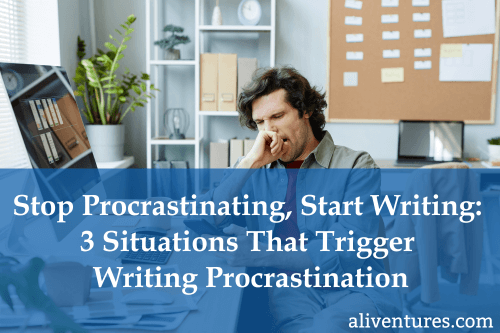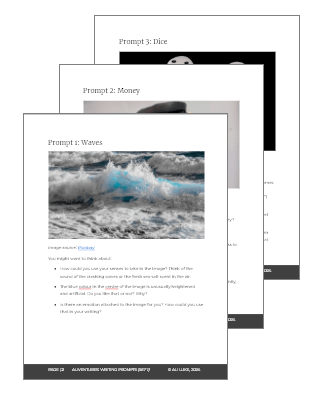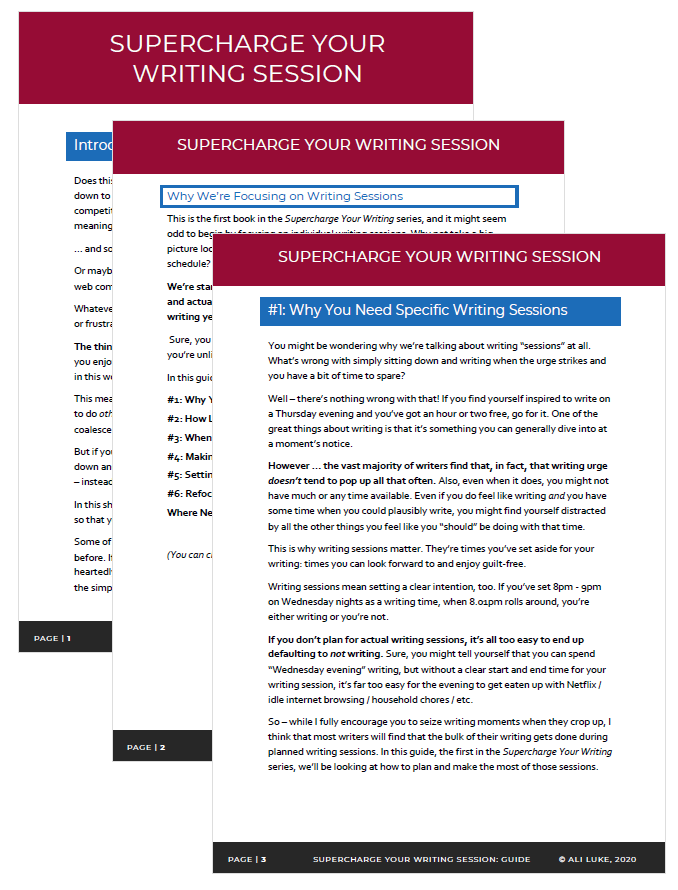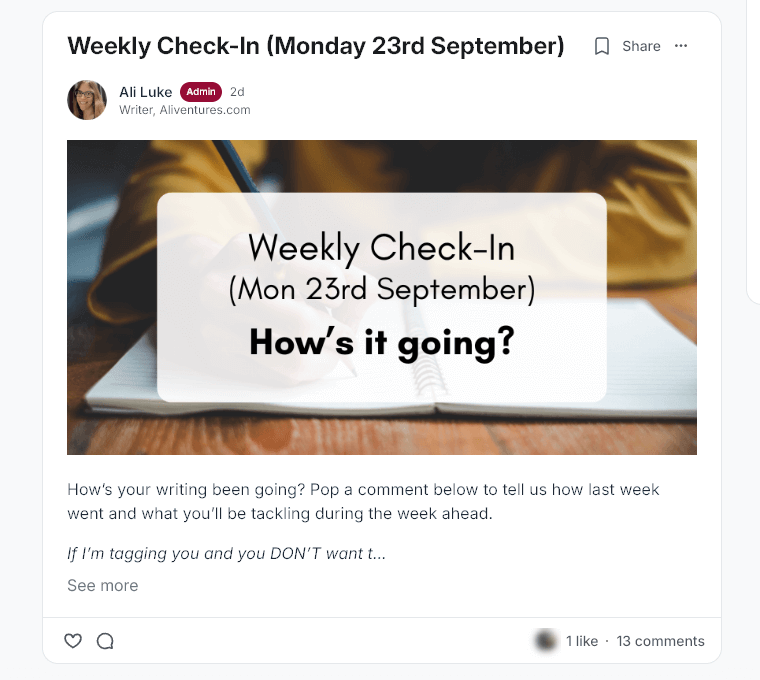Stop Procrastinating, Start Writing: 3 Situations That Trigger Writing Procrastination (& What You Can Do)

Procrastination is the bane of many writers … or would-be writers.
It can affect you at any stage of your writing life. And it’s one of the top problems I hear about (along with “time management” more generally) from Aliventures newsletter readers, Writers’ Cafe members, and coaching clients.
Writing procrastination looks like:
- Wanting to write … but never getting more than a few pages into your first draft.
- Spending ages staring at a blank page before giving up for the day.
- Writing a few sentences then stopping to scroll on social media.
- Leaving writing till the last minute before you have to write something to hit a deadline.
- Feeling frustrated that you’re “wasting” writing time and making slow progress.
It’s easy to feel like procrastination is your fault. Maybe you worry that you’re lazy, or that you’re just not cut out to be a writer. After all, if you really wanted to write, you wouldn’t procrastinate … right?
I’m not sure about that. I love writing – and I write freelance articles for a living! – but working on my fiction can still be a lot of effort. Sometimes, just sitting down to write in the first place can feel difficult.
If you feel the same, you’re absolutely not alone. Even full-time professional writers can struggle with procrastination – as anyone still waiting for the next Game of Thrones book can tell you!
Let’s take a quick look at the “why” of writing procrastination before we dig into some common causes of it.
Why Writers Procrastinate: Three (Very Understandable) Reasons
Talk to pretty much any writer and (if they’re being honest) they’ll admit that they procrastinate, at least some of the time.
Here’s why:
#1: Writing Takes a Lot of Effort
There are plenty of things I don’t procrastinate on in life. If I’m on the sofa with my phone in my hand, scrolling Facebook doesn’t feel like much effort. In fact, it’s so effortless, I often find myself gazing at Facebook posts without even remembering opening the app.
Funnily enough, I never find myself “accidentally” writing. 😉
Writing takes a lot of effort. It requires multiple different skills applied at once: for instance, you might be trying to work through a complicated plot point, reveal character, and pick the right words for authentic-sounding dialogue … all at the same time.
It’s only natural to resist applying that effort and to look for something easier to do.
#2: Writing Rarely Seems Urgent
Some things in life take effort, but we don’t procrastinate on them either, or at least not for long.
When it’s my turn to cook in the evenings, I don’t delay – because if I did, I’d have grumpy, hungry kids. There’s a deadline attached to getting dinner in front of them!
Maybe you always get your taxes filed on time, because you don’t want to pay a penalty. You might hate doing taxes and it might take you ages … but as that task becomes more and more urgent, you’ll find enough time.
By contrast, writing often isn’t urgent. Unless you’re hurrying to meet a competition deadline, it’s very easy to put off writing for another day (especially if there’s dinner to cook and taxes to file).
#3: Writing Really Matters to Us
Maybe you’ve thought that if you were a “real” writer or if you truly valued writing, you wouldn’t ever want to procrastinate … you’d just get on with it.
But when you care about writing and want to write something good, there’s a lot of weight attached to it.
The thought of typing the first sentence of your story is daunting because as soon as you start, you have to abandon the illusion that your writing can be perfect.
Perhaps all three of those reasons for procrastinating resonate with you—or perhaps you’ve got a slightly different reason for putting off writing. Whatever the “why” behind your procrastination, there are ways to move forward.
We’re going to take a look at some specific situations that often trigger procrastination—and how you can overcome them to move towards your writing goals.
Get encouraging weekly writing tips to your inbox every Monday – plus free ebooks to help you make the most of your writing time, build your confidence, and more. Join the Aliventures newsletter today (it’s free). Pop in your email address below:
Writing Procrastination Problem #1: Lack of Preparation
If you don’t really feel ready to write, it’s quite understandable that you might put it off: you still need to do some groundwork.
Maybe you don’t have a clear grasp of your characters, you don’t have an essay plan, or you haven’t done enough research.
If you feel lost and confused every time you think about your writing, then you may find it helps to spend more time on the “planning” stage of the writing process. This is especially true if it’s your first time working on this type of project.
Stop Procrastinating and Start Writing:
If you’re struggling with a lack of preparation, here are a couple of things to try:
Quick Fix: Set a timer for 15 minutes and get your writing space ready.
If your notebooks, pens, etc are scattered around the house, it’s hard to sit down and get started … so it’s easy to end up procrastinating.
Don’t spend ages setting things up. Give yourself 15 minutes to organise your space, then start on the writing. You can fine-tune your writing environment later on.
Longer-Term Solution: Create an overall plan for your project.
Your plan might only be a page or two long, but just having a good grasp of where you’re going with your project will help a lot.
With a non-fiction project, you’ll probably want to outline the whole thing: ideally, you’ll know what chapters you want to write and you’ll have a few notes or bullet points for each.
With fiction, you might prefer to have a looser outline. At a minimum, it’s helpful to develop your characters and have your key plot points planned out. You may also want to plan in a bit more detail for the next 2–3 chapters.
Writing Procrastination Problem #2: Too Many Writing Projects
Perhaps you’ve been working sporadically on your novel for years. You keep hoping that this is the year you’ll make significant progress – but you have so many other writing projects too.
Maybe you want to get a blog post out every week. Perhaps you promised to beta-read a novel manuscript for a friend in your writing group. Or you spotted a short story competition you want to enter – and you need to set your novel aside to hit the deadline.
This type of procrastination can be tough to spot and deal with. It feels like you’re being really productive. And in a way, you are. But you have that nagging sense of dissatisfaction: even though you’re getting lots of writing done, you wish you could finally finish your novel.
Stop Procrastinating and Start Writing:
If you have so many projects that you’re not getting time to work on what matters most to you, then:
Quick Fix: Starting right now, say “no” to any new projects.
If you make a living writing, you might not have the option of turning down work – but could you turn down new clients that aren’t a good fit?
If your writing isn’t your main source of income, then it might be yourself you need to say “no” to. Don’t start a new short story. Don’t take another writing course. Stick with the project you want to finish.
Longer-Term Solution: Make ONE project your true priority.
I know how hard it can be to settle on a single project when you’ve got lots of ideas or loads of different things on the go … but you’ll make much faster progress if you can focus on ONE thing. Any time two writing tasks are competing for your time, this one project takes priority.
If that’s really not possible, pick one project to concentrate on for a set period of time (e.g. a month) before deciding whether you want to switch to another.
Writing Procrastination Problem #3: Fear of Starting
For many writers, procrastination stems from self-doubt and a lack of confidence, perhaps even a fear of failure. In the first few years of my writing career, I found it hard to get going with new pieces of writing because I knew that as soon as I started, all hopes of perfection would have to be set aside!
If you find yourself doing the dishes, clearing your inbox, tidying your desk, sharpening your pencils, doodling … or doing just about anything to put off writing … then you may need to get past your fear of starting.
This type of writer’s block can show up strongly at the start of a new project, but it can also crop up on a smaller scale. Perhaps you always find it takes a lot of willpower to start writing on any given day, but once you’ve begun, it’s easier to keep going.
Stop Procrastinating and Start Writing:
If you’re finding it hard to start on a piece of writing, here’s what you can do:
Quick Fix: Set a ten minute timer … and write.
You can do anything for ten minutes (really). Even if you write the worst sentence ever committed to paper, it’ll be over pretty quickly! And you might well find that, after ten minutes, at least some of that initial resistance has melted away.
Having a time limit can really help you focus – it’s especially helpful for perfectionists, as it encourages you to just write. If you find this a helpful technique, you might want to “race” the timer and see how much you can increase your word count by in a very short session.
Longer-Term Solution: Set aside a chunk of time for writing.
Block out time on your calendar for writing. 30 minutes is enough, but ideally you might have 1-3 hours. Try to put this block at a time when you’re generally feeling reasonably focused and energised – for me, that’s not at the end of the day, but that might work for you.
This is always useful, but it’s particularly helpful when you’re starting a new project. I began a new novel a couple of weeks ago in a Writers’ Cafe writing hour: just knowing that other people were writing (and expected me to be writing!) helped me overcome that initial resistance to beginning.
Don’t let procrastination stop you writing altogether.
It can be tough to overcome procrastination, however much willpower or self-control you apply, if you’re not looking at the root cause of why you procrastinate.
So today, ask yourself what might be behind your procrastination – and see if one of the ideas above could help you tackle it.
Beat Procrastination for Good With These Resources
If you’re looking for more help with beating procrastination and managing your time as a writer, I’ve got some great resources to help:
Resource #1: Writing Prompts (free)

Aliventures newsletter members have access to this free set of prompts. You can use them as “warm ups”, as ideas for new pieces of writing, or as ideas for a work in progress. Each prompt has a word, related image, and my thoughts on different ways you might think about that word.
If you’re a newsletter member, get them from the free downloads library. You can find the password at the bottom of any newsletter email you’ve received.
If you’re not a newsletter member, you’re missing out! You can find out all about the newsletter here – it’s completely free, and it comes out each Monday with a short encouraging article about writing. Just pop in your email address below to join: [et_bloom_inline optin_id=”optin_19″]
Resource #2: Supercharge Your Writing Session ($8)

Supercharge Your Writing Session is a downloadable guide packed with practical advice. It also includes bonus printables to help you plan your writing sessions and get unstuck if your writing stalls.
Everything in Supercharge Your Writing Session is designed to help you focus better, get more writing done, and enjoy the process more as well.
You can buy Supercharge Your Writing Session on its own for $8, or you can get all four Supercharge guides for $20 (covering your Writing Session, Writing Week, Writing Environment, and Writing Progress).
Resource #3: Writers’ Cafe ($10/month)

Writers’ Cafe is my online community for writers. It’s a friendly, supportive place where the focus is on getting your writing done—so it’s ideal if you struggle with procrastination.
In the Cafe, you can:
- Join a writing hour – we run these three times a week. We spend five minutes telling one another what we’ll be working on, 50 minutes writing, and 5 minutes at the end saying how we got on. These are great for scheduling your writing into your week and for staying on-task.
- Check in weekly to share what you got done the previous week and what you’re planning to do during the week ahead. We have a check in topic in our community each Monday, and this is great for accountability – and for getting support if things aren’t going so well.
- Try a writing prompt if you need a little extra inspiration. Each Monday, I post a writing prompt in the Cafe. You can use these to write something fresh or to spark a new idea for a piece you’re already working on.
Of course, we also have lots of other community elements, like opportunities to share work in progress, a text chatroom, and discussion threads on anything writing-related you want to talk about.
We’re a kind, encouraging bunch of writers—across a wide range of genres, types of writing, and levels of expertise. Whatever type of writing you’re doing, we’d love to welcome you into Writers’ Cafe! You can find out all about it here.
About

I’m Ali Luke, and I live in Leeds in the UK with my husband and two children.
Aliventures is where I help you master the art, craft and business of writing.
Start Here
If you're new, welcome! These posts are good ones to start with:
Can You Call Yourself a “Writer” if You’re Not Currently Writing?
The Three Stages of Editing (and Nine Handy Do-it-Yourself Tips)
My Novels

My contemporary fantasy trilogy is available from Amazon. The books follow on from one another, so read Lycopolis first.
You can buy them all from Amazon, or read them FREE in Kindle Unlimited.

0 Comments